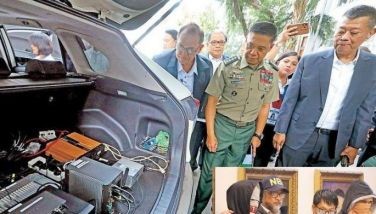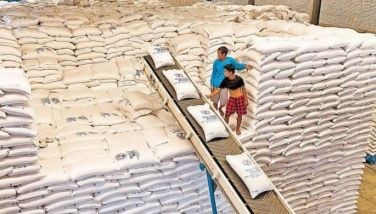Leaders urged to bring up regional rights issues at APEC, ASEAN
MANILA, Philippines — World leaders attending the Asia-Pacific Economic Cooperation Summit in Vietnam and the 31st Association of South East Asian Nations Summit in the Philippines should raise concerns about the “deteriorating” human rights situations in several ASEAN countries.
Rights watchdog Human Rights Watch stressed this point Thursday, saying that heads of states should address the bloody “war on drugs” in the Philippines, the Rohingya crisis in Myanmar, the crackdown on dissenters in Vietnam and Cambodia and junta rule in Thailand.
HRW called on leaders to use the ASEAN meetings to speak out about extrajudicial killings in the country, which have claimed lives of over 12,000 individuals, according estimates by rights groups and of government critics.
The government has disputed these numbers. According to the latest #RealNumbersPH data release, there have been 3,967 drug suspects killed in government operations since July 2016. Government officials, including Foreign Affairs Secretary Alan Peter Cayetano, said all of those killed were drug pushers.
The data releases no longer include information on "deaths under investigation", a tally of murders and homicides that police have yet to determine motives for.
READ: 6.225 drug-related deaths since July 2016, PNP says
“Surely, someone from among the 20 world leaders at these summits can confront [President Rodrigo] Duterte about his horrific and unprecedented ‘drug war’ killings. Widespread summary executions of drug suspects are not just illegal, they are ineffectual and cruel,” HRW Asia Director Brad Adams said.
Ahead of US President Donald Trump’s visit to the country, The Tom Lantos Human Rights Commission of the US Congress called on him to express his concern over the killings associated with Duterte’s drug war.
But Duterte, on Wednesday before departing to Vietnam for the APEC summit, said he wants Trump to lay off the topic of human rights during their first bilateral meeting.
“Lay off, that is not your business. That is my business. I take care of my country,” Duterte said.
He added: “I nurture my country to help. Nobody would.”
Duterte has received criticism from the international community for his bloody “war on drugs.”
The president, who does not take these criticisms well, has called these violations of Philippine sovereignty.
READ: Duterte to Trump: ‘Lay off’ topic of human rights
Rohingya crisis
Adams emphasized that the Rohingya crisis demands concerted global action as it is one of the worst human rights catastrophes in Asia.
“World leaders shouldn’t return home from these summits without agreeing to targeted sanctions to pressure Burma to end its abuses and allow in independent observers and aid groups,” he said.
HRW, moreover, noted that leaders attending summits in Asia should jointly call on the Myanmar government to allow the access of United Nations fact-finding mission in the northern Rakhine state and discuss the creation of judicial mechanisms to hold the perpetrators of abuse accountable.
Myanmar’s de facto leader Aung San Suu Kyi is attending the APEC Summit and will participate in ASEAN Summit in the country.
Suu Kyi has been criticized globally for her alleged failure to stop the military crackdowns against Rohingyas—a long-persecuted minority in a Buddhist-dominated Myanmar.
More than 600,000 Rohingyas have fled to Bangladesh to escape murder, rape and destruction of villages since August 25.
READ: Malaysia calls Cayetano's statement on Rohingya crisis a 'misrepresentation of reality'
Attacks versus dissenters in Vietnam, Cambodia
Adams said that visiting leaders need to call on the government of Vietnam—a one-party state—to release political prisoners and stop persecuting peaceful dissent.
According to HRW, more than 100 political prisoners are languishing in Vietnam prisons for “simply exercising their basic rights.”
Under Vietnam’s criminal law, criticizing the Vietnamese Communist Party can be treated as a national security threat.
HRW also asked heads of governments to press Cambodian Prime Minister Hun Sen, who has been in power for almost 33 years, to drop his “baseless legal attacks” on the main opposition party and demand the release of opposition leaders detained on trumped-up charges.
Hun Sen’s ruling party Cambodian People’s Party has forced the closure of the newspaper The Cambodia Daily, stopped broadcasts of independent radio and harassed human rights organizations.
Thailand’s junta rule
Thailand’s allies should use the APEC and ASEAN summits to urge the Thailand government to restore civilian democratic rule and political freedoms, HRW noted.
Under Thailand Prime Minister Gen. Prayut Chan-ocha’s junta rule, political activities and peaceful assemblies have been banned and thousands of people have been detained for criticizing the government, military or monarchy.
“Thailand was once one of Asia’s leading democracies but now it is stagnating under military rule,” Adams said.
- Latest
- Trending
































